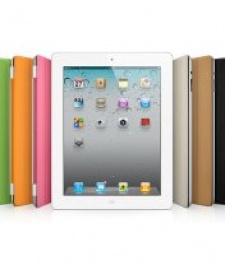In the hours leading up to Steve Jobs' surprise appearance at Apple's iPad 2 unveiling in San Francisco, the pressure was mounting.
Portions of the press keen for some pre-conference hits hurriedly ran up headlines that those within Apple were already writing off iPad's successor as 'a generation to skip'. According to unnamed sources, it's iPad 3, rather than iPad 2, that will blow away the competition.
Of course, it's not overstating affairs to suggest that Apple could quite easily out-perform its rivals at the tills with its existing iPad.
Though sales will naturally rise as a result of iPad 2's debut, with the majority of the competition not likely to roll out until the spring or later Motorola's Xoom, Samsung's Galaxy Tab 10.1, RIM's BlackBerry PlayBook and HP's TouchPad the most notable pretenders to the crown it's unlikely any of them will have a chance to severely impact Apple's position at the top of the tablet table before the year is out, whatever iPad model happens on the shelves.
Software the key
Even as things stand, iPad 2's greatest invention appears to be a nifty cover-cum-stand. On the surface, Android advocates might feel like they've weathered the storm and come out on the other side smiling technologically speaking, most of iPad 2's rivals already offer a comparative set up.
But there's one major reason why that, even without its dual-core A5 processor, 33 percent thinner casing and front and rear facing cameras, iPad is still untouchable in the tablet space: iOS.
For the majority of consumers, iOS with the addition of iTunes and the App Store is leaps and bounds ahead of Android, BlackBerry and webOS because it offers an all-in-one set up. Not only does it have the largest app marketplace and access to what's (most likely) the greatest array of digital music on the planet, but it also serves it all up in one, neat package.
From purchase through to play, the App Store set up is an unrivaled experience.
As is the case with iPhone, once a consumer touches base with iOS, they're locked in. Though the tracks on offer are no longer specifically tied to iTunes, the ease of syncing them with iPhone, iPod touch and now iPad means the majority are especially unlikely to break ties with their iDevices to hook up with any of Apple's rivals quite simply, Apple has all bases covered.
Ahead of the pack
It's one of the major reasons why developers have charged onto the App Store. The ability to sell their wares on a platform that consumers in their millions already tap into day in, day out to pick up music digitally is irresistible.
To put it bluntly, as a mainstream proposition, Android on both handsets and tablets is something of a mess. It'll always have the the enthusiast market sown up, but it's the open nature of the platform that's both its strength and its weakness. The majority of consumers investing in a tablet are looking for stability and ease of use.
Though Gingerbread undoubtedly goes some way to closing the gap, it simply cannot compete when it comes to the range of apps on offer, the ease in which they're delivered, and the network as a whole iPad plugs consumers into.
It's on that basis alone that I'd suggest it's unlikely any rival tablets launched in 2011 will come anywhere near taking on iPad's current dominance. Consumers intent on buying an iPad 2 are unlikely to be swayed from making that purchase in favour of one of its rivals.
Instead, it's entirely possible those considering picking up a Xoom might consider opting for TouchPad or PlayBook, and vice versa. The market will be split in two for some time to come; on one side, iPad, and on the other, everything else.
Web apps on the rise
All that said, however, it's Apple's reliance on the App Store that, in the years that follow, may well lead to iPad's challengers gaining significant ground.
Much chatter suggests that the days of the all-conquering native apps are numbered; with the rise of HTML5 a language Apple itself has been a major supporter of so the prospect of web apps that can outperform those currently listed on app marketplaces is likely to become a reality.
Web apps are favoured by many a developer, simply because they break down barriers; they can be multiplatform but developed as one entity, and they can enable players of any HTML5 equipped device to take on each other regardless of the hardware they're playing on.
Importantly, they also enable studios to bypass both the revenue cuts and the rules and regulations set by platform holders. The market will be laid wide open, and the possibility of developers being able to control every aspect of their apps and how they're delivered is too tempting a prospect for most of them to resist.
Once web apps are able to compete with native apps, one of Apple's major holds over the industry will be nullified, enabling its rivals in both the smartphone and tablet markets to make major ground. As things stand, however, despite the lack of shocks and surprises at its unveiling, iPad 2 looks like it'll deliver business as usual for Apple in 2011.
Opinion: iPad 2 may be smoke and mirrors, but Apple is still a class above
It's software, not hardware, that is the key





















